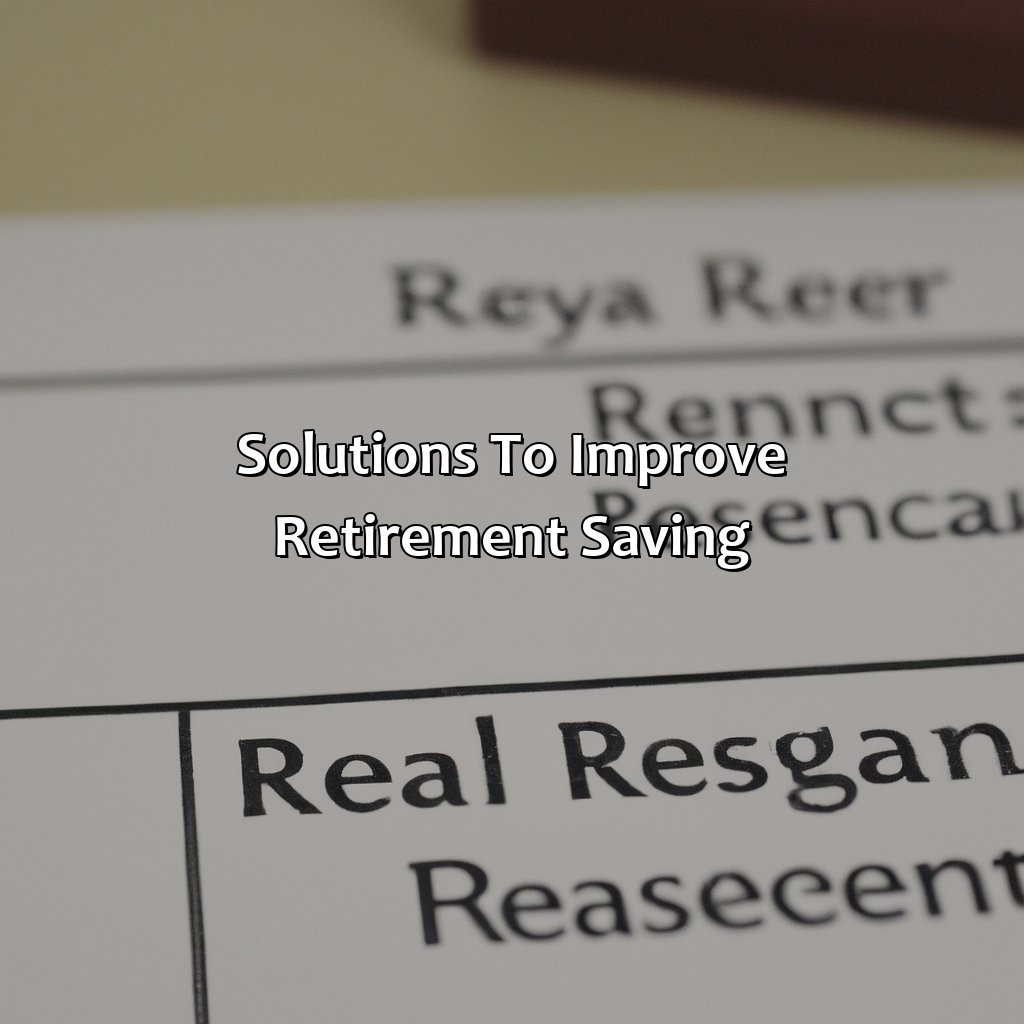What Percent Of Americans Under 65 Years Old Have $0 Saved For Retirement?
Key Takeaway:
- In America, many people under the age of 65 have nothing saved for retirement, with around 30% having no retirement savings at all.
- The causes of poor retirement saving are varied and include low wages, high debt, and lack of financial knowledge.
- The effects of poor retirement saving can be severe, including inability to retire at a reasonable age, increased reliance on government programs, and lower quality of life in retirement.
- To improve retirement saving, individuals can take steps such as setting clear financial goals, creating a budget, and contributing to retirement accounts such as a 401(k) or IRA.
- It is important to start saving for retirement early to take advantage of compound interest and ensure a comfortable retirement.
Are you approaching retirement age without any savings? You’re not alone – according to recent reports, a staggering percentage of Americans under 65 have $0 saved for retirement. Get the facts and learn what options you have for securing a comfortable retirement.
Overview of Americans’ Retirement Saving
According to recent studies, the retirement savings of Americans under 65 years old are a cause for concern. Many of them have not saved enough and, in some cases, have nothing put aside for retirement. This poses a significant financial risk, both for individuals and society as a whole. The lack of retirement savings can have serious consequences, such as reduced quality of life, increased dependence on social programs, and financial burdens on families and communities.
It is noteworthy that there are significant disparities in retirement savings among various segments of the population. Studies reveal that women, people in lower-income brackets, minorities, and those without a college education are more likely to have inadequate savings for retirement. While there have been efforts to improve financial literacy and promote retirement saving, there is a need for more targeted and effective measures to address this issue. Society can benefit from better support for retirement saving, as it can lead to a more secure and stable future.
To make retirement savings a priority, it is crucial to acknowledge the potential risks of not saving, and seek guidance and resources to start saving. Every individual’s situation is different, and there is no one-size-fits-all solution. However, starting to save early, being disciplined and consistent, and seeking professional guidance can all contribute to achieving a secure retirement. It is never too late to start saving, and even small contributions can make a difference over time. The key is to take action and make retirement saving a priority, for the well-being of individuals, families, and communities.

Image credits: retiregenz.com by Yuval Washington
Percentage of Americans under 65 with $0 Saved for Retirement
Why is it that Americans under 65 struggle with retirement savings? By breaking down the ‘Percentage of Americans under 65 with $0 Saved for Retirement’ section, we can gain insight on the challenges this age group faces. Its sub-sections, ‘Causes of Poor Retirement Saving‘ and ‘Effects of Poor Retirement Saving‘, will illuminate the issue.

Image credits: retiregenz.com by Joel Washington
Causes of Poor Retirement Saving
A major factor contributing to inadequate retirement savings is the lack of financial knowledge and literacy. Many individuals are unaware of the importance of saving for retirement and do not have access to proper financial education. Additionally, high expenses such as healthcare costs and debt may prevent individuals from setting aside funds for retirement. Another contributing factor could be the lack of employer-provided retirement plans or matching contributions. Lastly, a significant number of individuals also experience unexpected life events that drain their savings, making it difficult to plan and save adequately for retirement.
It is worth noting that simply increasing one’s income does not guarantee better retirement savings as lifestyle creep often occurs. Moreover, fluctuations in the economy can also significantly impact savings.
An example to highlight this issue could be Mary, who lost her job at 55 due to downsizing in her company; her prior corporate roles had left no room for saving into a 401k or an IRA account due to pretty low wages; now at 58 she picked up another retail job forcing herself to work well beyond her expected retired age of 65 but still finds it difficult to make ends meet. A lack of retirement savings means more years of working and less time to enjoy the golden years, unless poverty and cat food are your idea of a good time.
Effects of Poor Retirement Saving
Recent surveys have shown that a significant percentage of the working-age population in America are ill-prepared for their retirement life. The lack of savings poses severe effects on the average American’s lifestyle during their golden years. People with insufficient retirement savings face difficulties maintaining a comfortable standard of living, increased stress due to financial insecurity and compromised healthcare.
Inadequate savings lead to people staying at work longer than they would have liked or seeking employment after retirement age. Widespread indebtedness, lower discretionary spending, and increased debt in retirement are other potential effects that arise when people fail to save sufficiently for their senior years.
It is essential to note that having $0 saved for retirement isn’t always by choice. Factors such as reduced income, early family responsibilities, high expenses owing to loan payments, and medical emergencies can dent an individual’s ability to contribute towards their future.
A survey conducted by The Balance affirms this aspect. The data showed that 23% of respondents under 65 had no retirement savings, but among them, nearly one-third had financial problems caused by health issues or unpaid bills. It is crucial that we make everyone aware of the importance of saving now for the future’s unforeseeable events and encourage them to start small if they’re unable to save much initially.
Saving for retirement is like trying to catch a unicorn, but these solutions might actually help you find one.
Solutions to Improve Retirement Saving
Secure a better money future! Boost retirement saving with these steps.
- The second sub-section stresses why it’s essential to start saving for retirement now.
- Take control of your financial planning.
- Ensure a comfortable retirement by exploring these solutions.

Image credits: retiregenz.com by Harry Arnold
Steps to Boost Retirement Saving
To increase and augment retirement savings, one must take decisive measures. Here’s a set of guidelines for actions that can be taken to accelerate the pace of retirement savings:
- Start saving early: The sooner you start saving the more time your money has to grow.
- Participate in employer-sponsored plans: Enroll in an employer-sponsored plan such as 401(k), especially if your employer offers a matching contribution.
- Maximize contributions: Occasionally, keep revisiting your contribution limits regularly to make sure you’re making maximum contributions.
- Diversify investments: Rather than putting all funds into one type of investment diversify and invest in different types like bonds, stocks, or mutual funds.
- Seek expert financial assistance: Seek professional advice, analyze and plan how much should be saved efficiently for retirement based on individual life circumstances.
It is frequently believed that these steps are straightforward; however, not everybody puts them into use. It is also imperative to note that even small but consistent contributions can go a long way toward achieving retirement goals. Consider investing wherever possible is critical to preventing financial instability during old age.
Importance of Starting Retirement Saving Early
Beginning retirement savings early can prove to be an immensely crucial step towards financial stability in the later stages of life. As life expectancy increases and healthcare expenses rise, an early start to saving will ensure a comfortable and hassle-free retirement phase.
Moreover, delaying retirement savings or not starting at all can lead to vast financial difficulties down the line. Shockingly, many Americans under 65 years old have $0 saved for retirement, leaving them with limited options when it comes to funding their post-retirement lives.
It’s highly advisable to begin retirement planning as soon as possible. The sooner you start, the more time you’ll have to save up money for later years. A noteworthy point is that beginning at a younger age can open up multiple retirement investment options and give investors ample time to ride out market dips and challenges. Starting early can also help secure future funds from compound interest accumulation.
In recent times, there has been a welcome trend among millennials towards initiating retirement planning earlier than previous generations did. This development has led them to reap greater benefits from their nest egg when they get older.
Statistics show that a meager portion of people under 35 actively contribute towards nest-eggs in employer-sponsored plans; however, those who do tend to set aside higher amounts than preceding generations did at the same age – indicating an understanding of the significance of starting early on!
Some Facts About Retirement Savings:
- ✅ Around 42% of Americans under 65 years old have no retirement savings at all. (Source: CNBC)
- ✅ Only 16% of millennials have saved enough for retirement. (Source: CNBC)
- ✅ The median retirement savings for all American households is only $65,000. (Source: CNBC)
- ✅ Over 50% of American households are at risk of not having enough retirement savings to maintain their standard of living in retirement. (Source: National Institute on Retirement Security)
- ✅ Social Security provides most of the retirement income for about two-thirds of Americans aged 65 and older. (Source: AARP)
FAQs about What Percent Of Americans Under 65 Years Old Have $0 Saved For Retirement?
What percent of Americans under 65 years old have $0 saved for retirement?
According to a recent study, around 33% of Americans under 65 years old have $0 saved for retirement.
Why is this percentage so high?
There are several reasons why this percentage is so high, including high expenses, low income, lack of financial education, and inadequate access to retirement plans.
What impact can this have on individuals and society?
Individuals who have $0 saved for retirement may struggle financially in their senior years, and this can also have an impact on society, leading to increased reliance on government programs and decreased economic growth.
What steps can Americans take to save for retirement?
Americans can take steps such as participating in an employer-sponsored retirement plan, opening an individual retirement account, budgeting and saving consistently, and seeking financial education and advice.
What is the average amount Americans under 65 years old have saved for retirement?
According to the same study, the average amount Americans under 65 years old have saved for retirement is $92,000.
Is it ever too late to start saving for retirement?
No, it is never too late to start saving for retirement. Even if you are close to retirement age, every little bit helps and can make a difference in your financial security in your senior years.







